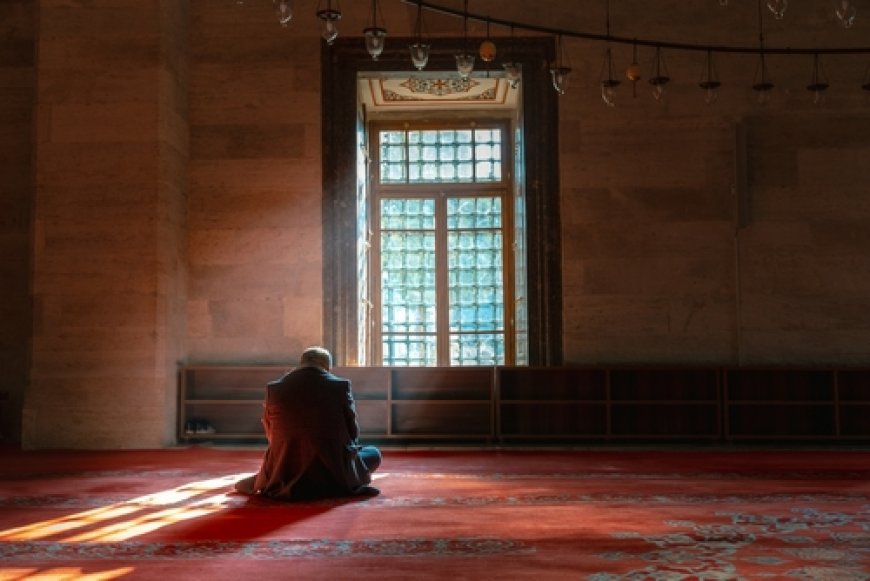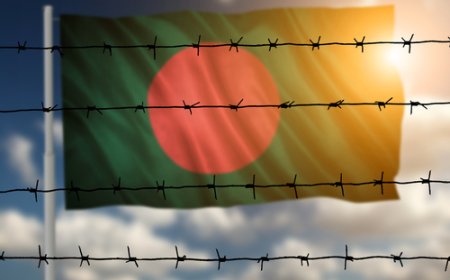The Future of Islamic Politics in Bangladesh
The truth is: the only path by which Islamists can succeed is exactly the path the League had chased them down. But will it be enough now that the League is history? Only time and the wisdom -- or lack thereof -- of the other political parties will tell.

“Let's say 2020 or 2025 -- both Khaleda and Hasina have departed from this world -- what will the political situation in Bangladesh be like then? Will the Islamists become the third force? Will Jamaat lead the Islamists or will some new party represent the Islamists? Will the Islamists become more powerful than BNP-League by then?”
I posed these questions in a Bangla article I wrote in 2014, not even a year after the commotions at Shahbagh and the brutality at Shapla. These questions, of course, remain very much alive in Bangladesh's politics. Diplomats ask politicians about this, concerned citizens ask journalists. I too have repeatedly discussed this topic with many people, with my friends who are superior to me in intellect, education, and profession -- this topic repeatedly comes up in conversations with them as well. I felt it was very necessary to write down our thoughts at that time. What follows draws heavily from that article.
First, let me define the boundaries of some terms; this is essential, as the relevance of these terms will change in the future.
By 'Islamist' I mean those who believe in political Islam and engage in politics and activism accordingly. Going to the mosque five times a day certainly doesn't make one an Islamist, nor is participating in the politics of Jamaat-e-Islami the only condition for being an Islamist. This is an umbrella term and I've used it as such.
By Islamization, I'm not referring to conversion from other religions to Islam in this essay. The term Islamization is used in this essay only to mean Muslims' renewed awakening to the religion of Islam. I've borrowed this term because I couldn't find any universally accepted defining word for this phenomenon.
By 'centrist' I mean people participating in political processes who believe in the co-existence of all parties, place reality and logic above ideology and ideals, and above all, are not extremists in terms of political ideology. My experience suggests that while there may not be truly centrist parties in Bangladesh, BNP is more centrist in character than the other two streams, and there are people with centrist tendencies in all parties.
I'm not using 'Shahbaghi' in the sense that whoever went to Shahbagh is a Shahbaghi. To me (this is my personal opinion), when the Awami League has money, it transforms into a spiritual project, not a political party. By Shahbaghi, I mean the foot soldiers of this spiritual project. Note that one can be a foot soldier of this spiritual project without being involved in Awami League politics.
A Small Observation From My Life
I'm recalling the period of 1987-90. I was a kid then, but I clearly remember some things mentioned by the adults. Since my father joined the air force in the 1950s, his friends often discussed who would become the next Air Chief (some of their contemporaries were still serving then). Regarding Air Vice Marshal Jamal (he hadn't become chief yet), some of them thought that he could never become chief because -- in simple Bangla, he was a huzur (religious person) and his wife wore hijab.
Fast forward a quarter century, when I first wrote it, and another decade since.
Today in Bangladesh, moving up the ladder just because one is a huzur doesn't seem so difficult because huzurs and hijabis now have sufficient visibility at all levels of society. We saw nothing close to this in our childhood.
On the other hand, the number of sleeveless kameez and blouses we see now at social functions -- we saw nothing close to this in our childhood either. The interesting thing is that wearing sleeveless kameez and blouses or conical bras in the upper middle class was very normal in Bangladesh before we were born, in the 1960s and 1970s -- a CD was made for Holy Cross School's 50th anniversary, you'll find proof of this if you look at the photographs from that time.
Again, in the 1980s, our mothers were the age many of our wives are now. I used to see them doing milad every Thursday afternoon, and I remember that even the wives of very high-ranking people would come to these. Whether you want to call this their era's hangout is up to you; but I think the non-hijabis of that time lived more religiously compliant lives than the non-hijabis of today.
Those who grew up in Dhaka will probably agree with these observations of mine. If you try to extract 'one' pattern from all these scattered observations, or want to reach a political conclusion from social observations, you would be wrong. There's no simple explanation for this social evolution. However, Eric Hobsbawm mentioned a closely similar pattern in post-Industrial Revolution Britain -- where along with the creation of new capital, religious activity increased tremendously. One group was going 'astray' while another group considered the massive expansion of Christianity to be the cure for this disease.
The complexity mentioned in the context of Bangladesh is at the social level. Add to this the political complexity -- such a difficult jigsaw puzzle will be created that has no solution. And the problem is that in such a situation, whatever perspective you hold, you can very easily provide an explanation according to it. For example, Shahbaghis used to think that if the Awami League is not in power, the entire country would become Afghanistan. Conversely, BNP people used to think that there's no possibility of such radical Islamization in Bangladesh; rather, arrogant secularism has been the biggest problem. The point is, whatever your own political beliefs may be, a decade ago I warned of a terrible future -- whether that is upon us now, I leave to you.
Why Has Islamization Happened So Rapidly?
The first question is why has there been such rapid Islamization in Bangladesh since the 1990s, and especially the last 20 years?
A Bangladeshi I know in Canberra who taught in a village in Bangladesh in 1984; his experience was that at most one out of ten people in the village wore a hijab then, and now in that same school eight out of ten wear hijab, but now almost every one of them is 'dui number’ (duplicitous), whereas in 1984 every girl was ‘simple and straightforward.’ His view is that the main reason for this is the NGOs and Middle Eastern money.
For the region he's talking about -- it's true that the Middle Eastern and Jamaat money has been used for Islamization work there (though not in all regions of Bangladesh). But the problem is that he's treating religion as a product, that is, the more money (= mileage = investment), the more Islamization. Such purely money-based explanations of social evolution often don't work.
But the biggest flaw in this explanation is -- the Islamization that now makes it seem like Islamic politics has risen so sharply in Bangladesh, that is, the spread of Islam among the urban under-40 population—this oil money has done almost no work there.
I've seen that countless young men and women who are children of upper-middle and upper-class families and have graduated from well-known schools and colleges in the city and are very successful professionally -- they too have become attracted to this ascendant Islam, which was almost never seen in my childhood in the 1980s. One of my friends has quit television modelling and become a bearded, high-salaried executive. Another friend of ours graduated from IBA and now teaches Arabic. And this change is not one or two, but in the thousands.
How Did This Happen?
First, my oversimplified explanation: Of what we studied in school and college textbooks, surprisingly but truly, only Islamic religious education is relevant in real life.
The Bangla we learn in Bangla books, no one speaks that Bangla, it's not even heard much on TV anymore.
Whether the English that's in the books was ever practised in any country, I doubt -- it's full of absurd stories about flawless ten-year-old boys with personality.
In maths, we learn that two plus two equals four -- in real life this sum can be five, six, or even five hundred.
Science has almost no use in daily life of a Bangladeshi (using science and using technology made by others are not the same thing).
On the other hand, Islamic education says submit and you'll find peace. My knowledge about what actually happens to the newly faithful is very limited, but those who are devoted to Islam say that what religious education books promise, they also deliver; by submitting themselves, they have found peace.
In our time, I'd say roughly from the mid-1990s, a worldwide phenomenon has occurred, and that is there is no longer any effective philosophy in our lives, no collective transcendent truth. Humans are creatures who want to see the implementation of some philosophy in others' lives to see the completeness of their own lives. In our country, from the 1960s to the 1980s, young people satisfied their hunger for philosophy through socialism. For various reasons, this changed in the 1990s. The fall of the Soviet Union, the ideological lapse of Bangladeshi leftists, the worldwide decline in the attraction to leftism -- all played a role to some extent.
In our time in this country, Islam has somewhat filled the void of philosophy -- at least in some people's lives. An inevitable consequence of this is an attraction to political Islam. Islam is somewhat peculiar in this regard. If ten people become attentive to Islamic teachings, you'll see that five of them consider political Islam essential for their overall spiritual liberation -- this doesn't apply in the same way to other religions. Needless to say, if these five are educated youth, gradually you'll see their political aspirations being expressed through adopting some Islamic political ideology.
Now, there are usually two wrong interpretations of this phenomenon. The first is that many think most of these young people are Jamaatis. In fact, among many in this new urban Islamist class -- the two main propositions of their political identity are disliking Jamaat and viewing Qawmi madrasas and Hefazat with slight contempt, and through this many try to be separate from both. You could say it's an intellectual fad, but sufficient for not declaring political or social unity with each other. It's somewhat like how girls who graduated from Viqarunnisa School view girls from Bharateshwari Homes.
But this mistake is not as serious as the second one. Shahbagis, old Awami Leaguers, centrists, BNP supporters, civil society, elites -- I mean a huge section of the urban class used to think these Islamists are under-achievers. In Bangladesh in the 1960s and 1970s, the most talented people did leftist politics; in Hasina's Bangladesh, it would be an understatement to say the most talented people were apolitical, they actually hated it. But among those who did do politics (meaning those who physically did activism, join parties, organize -- not just on Facebook), the most talented and well-read boys and girls were undoubtedly either Islamists or leftists in political orientation (but the number of leftists was very small).
The Future of Islamist Politics
The question is, the real question is -- can these Islamists organize, and if so, what kind of Islamists will they be?
First: I'm certain about one thing -- that Bangladesh's Islamists are in character closer to Turkish Islamists, not like the Taliban, because a huge portion of Islamist leaders and leadership are actually entrepreneurs -- in simple language, they have money and even if they don't understand Islam, they understand business well. If they can ever come to power -- the profession I think will be happiest about them are the business class -- because Bangladesh's Islamists are extremely business-friendly.
But to come to power, can they show the amount of cohesion and maturity required?
Bangladesh's Islamists are also Bengali Islamists -- they have an infinite passion for pointless arguments. The hunger for discussion about who among themselves are followers of the purest Islam will remain valid even after Judgment Day. It wouldn't be an exaggeration to call this the quintessential characteristic of Muslims.
And yet, from Shahbaghis to many Islamists, there is a belief that BNP's massive popular support across the country is gradually becoming Islamist. The reason they think this is that BNP's ideological foundation is weak, whereas Islam is a 1,400-year-old ideology. BNP has survived only because of the reaction to Awami League and Khaleda Zia's leadership. Now that the League is gone, after Mrs Zia’s death, everyone will leave BNP and become Islamist. That is, centrists will gradually become extremists. I've seen roughly similar ideas among some BNP supporters as well.
I asked this question to a top BNP leader who has observed Bangladesh's politics closely for roughly fifty years and whose political wisdom can be trusted. He said, even if we accept everything else, who will lead the Islamists? Bangladesh doesn't have organic politics. Without leadership, no political party in Bangladesh can ever grow. In his opinion, among Islamists, no section other than Jamaat 'understands politics,' and the only Jamaat leader he thinks had the necessary sophistication and foresight to understand what role an Islamist party will play in the changed world -- he was hanged by the Hasina regime.
But What If ...
After Hasina, no leader in Bangladesh will ever be able to consolidate that much power -- that much is known. In that gap, what if Islamists find an Imran Khan? West-returned, gives speeches in English, clean-shaved, quotes Milton Friedman and also pronounces Quranic verses in proper Arabic in rustic speeches. Many people could argue that Islamists will be more successful than BNP in terms of governance. What if centrists from various parties come under the flag of Islam?
I don't dismiss this possibility. But I think Islamists will not succeed. Why?
The problem is Islam itself. Liberalism has an advantage that Islam doesn't have. When personal questions arise, liberalism can say -- this is your problem, buddy, do whatever you like. Whether you drink alcohol or wear sleeveless kameez is your own business -- I have nothing to do with it. On the other hand, Islam is by definition a religion; it has to react, it cannot take the role of a spectator. Islam cannot say do whatever you like, this is not my problem.
However, to run a state, being able to say 'this is not my problem' is very important, which Islam cannot do.
Islam is a religion but the state is a political construct. At the end of the day, the reality is that political Islam is not compatible as the guiding ideology of the state system that is the result of European Enlightenment. The philosophical destination of the state is individual freedom, and the philosophical destination of Islam is peace achieved through submission. The question is not whether Islam is good or liberal democracy is good; rather, it's an issue of compatibility -- does Islam go with the 'state system'?
Even for political Islam to achieve initial success in our country, several fundamental questions must be resolved. Perhaps Islamists all over the world will have to do this.
What Are These?
Guidance for political Islam is not directly in the Quran (such as whether your leader will be elected by vote). But how a Muslim's personal life should be -- there are extremely detailed explanations of this in the Quran. Those who want to see political Islam as a state-governing ideology will have to compromise on some matters that have guidance in the Quran.
For example, Islam has some obligations regarding clothing, there's no "if" in this; but there are many Muslim boys and girls who don't follow or don't want to follow these obligations. Thus far, Islamists could keep their eyes closed because they can say, brother, this is not our headache because we don't have power.
But when power comes, they won't be able to remain spectators; they'll have to take a side. To implement Islam at the state level, for which there's no direct guidance in the Quran, will they be able to show the courage to compromise with Islam at the individual level, for which there is direct guidance in the Quran?
I think Islamists haven't come close to the kind of consensus needed worldwide for such courageous steps. Muslims have been arguing for 1,400 years and haven't reached agreement on even how their leader should be chosen. Bengali Muslims are one step further. They love arguments and are most interested in childish arguments (that the Economics Nobel Prize is not actually a Nobel Prize and it would be a huge crime to call Economics Nobel laureates Nobel laureates -- Bengal's fiery intellectuals discuss this at length in national media).
This is not our headache -- you do whatever you want, I have no opinion on this -- even thinking like this is blasphemy for Bengalis.
The people of Bangladesh are centrist in character -- they shed tears at religious sermons and also moisten their hearts watching folk theatre. The key to long-term political success lies in this balancing act. Whoever leans too much to one side will be in danger. BNP understands this, and once upon a time Awami League also understood it.
The Islamists don't have the collective maturity needed to do this work. I don't know if they will in the future. The Islamists' greatest asset has been the Awami League. The only war in which religion has the greatest chance of victory is a religious war, and Awami-Shahbaghism gifted the Islamists a religious war.
The polarization project that Awami League undertook had only one outcome: two religious fanaticisms -- Shahbaghi consciousness versus Islamic fervour, with the latter in the ascendance with Hasina’s flight. Whether the entire country becomes engrossed in destructive fanaticism -- that's what remains to be seen.
In a survival act, there's no opportunity for thought. The problem is that the entire nation pays the price for not allowing the victors of survival acts to think -- there are hundreds of examples of this in history.
The truth is: the only path by which Islamists can succeed is exactly the path the League had chased them down.
A slightly different Bangla version was written in 2014 and published in 2020 in the book Bangali’r Medicrity’r Shondhane.
What's Your Reaction?














































































